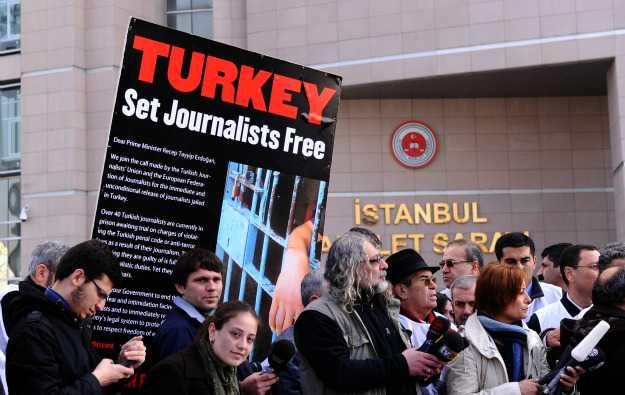As Prime Minister Erdogan’s government grows increasingly intolerant of dissent, the media is bearing the brunt of its effort to silence its critics.
BY ALIA MALEK
When the terrorism trial of jailed Turkish journalists Ahmet Sik and Nedim Sener began in Istanbul on Nov. 22, only a handful of their colleagues — far fewer than expected — gathered in protest outside the courthouse that will decide their fate.
A mosaic of the smiling photographs of many of Turkey’s detained journalists was laid out on the ground at the foot of a swarm of TV tripods, their cameras aiming for a glimpse of the defendants. Sik and Sener’s case is perhaps the most high-profile example of what critics see as the Turkish government’s crackdown on critical voices, which has transformed it into one of the world’s leading jailers of journalists.

Some of the protesters wore T-shirts with a cartoon of a hand covering the mouth of someone trying to speak. Others carried signs written in English and Turkish. “TURKEY SET JOURNALISTS FREE; THERE CAN BE NO FREE SOCIETY WITHOUT FREE JOURNALISM,” read the centerpiece.
Only one prominent columnist from the mainstream daily Haber Turk, Ece Temelkuran, was willing to risk joining those outside the courthouse. Already that morning, a colleague dropped by her office to tell her he was too afraid to go. He had moved his wife and children abroad and will join them as soon as he can.
“I too am afraid,” Temelkuran admitted, eyeing the size of the crowd. “I’m freaking out.” Having written repeatedly against what she sees as a crackdown on those who oppose AKP or Erdogan, she keeps a lawyer on stand-by should she be summoned.
Indeed, during the demonstration several people approached Temelkuran, a recognizable public figure, and said, “Next time, we’ll be here for you.”
Sik and Sener have been detained since March, on charges that seemed at first too ludicrous to stand. They are accused of being members of Ergenekon, a shadowy, ultranationalist group that allegedly has been trying to foment a coup against the Turkish government – despite the fact that Sik is known in Turkey for having written the definitive exposé on the group.
Sik’s supporters believe he ran afoul of the Turkish justice system when he began to investigate the influence of the Fethullah Gulen movement, a powerful Islamist network that is one of Prime Minister Recep Tayyip Erdogan’s most important pillars of support. Sener’s research into the murder of the Armenian-Turkish journalist Hrant Dink — which asserted that the police and the state were involved in his killing — touched on another of Turkey’s taboo subjects.
Sik and Sener’s detention are hardly an anomaly in today’s Turkey. Currently, 76 Turkish journalists are in jail, more than in any other country. In a Dec. 20, roundup, several more journalists were among those newly detained when the Turkish government jailed roughly 40 people, accusing them of links to Kurdish militants.
In addition to journalists, Erdogan’s government has jailed lawyers, academics, and students, also ostensibly on terrorism-related charges that critics counter are transparent attempts to stifle freedom of expression and dissent.
The arrests, however, have yet to shock the conscience of most Turks. In June, voters returned Erdogan’s Justice and Development Party (AKP) to power in a landslide. The current narrative that dominates discussion about Turkey — both internationally and domestically — emphasizes its booming economy and regional ascendance. For admirers in the Arab world, the AKP’s devout orientation represents a path they seek to emulate. And for those in the West concerned by Arab Islamist parties’ success at the ballot box, Erdogan’s party is a comforting model for reconciling piety and democracy. Similarly, with the United States eyeing an opportunity to weaken Iran’s influence in the region, specifically in Syria, Turkey has become ever more strategically important.
With Turkey and Erdogan basking in the glow of such electoral and international approval, watch-groups and critics say AKP feels entitled to have an equally friendly media and public at home.
via Turkey’s War on Journalists – By Alia Malik | Foreign Policy.

